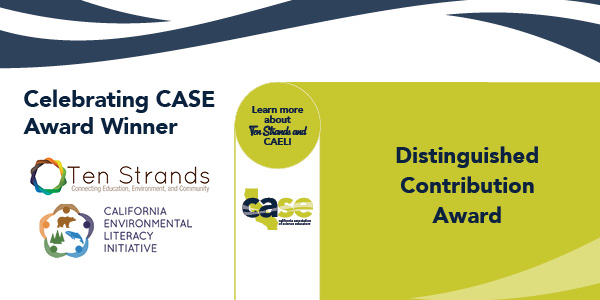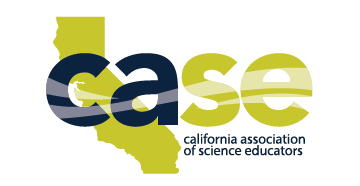
Ten Strands and CAELI
2020 Award Winner
Distinguished Contribution Award: Ten Strands and California Environmental Literacy Initiative

For this interview we spoke with Karen Cowe, CEO of Ten Strands and Project Director of the California Environmental Literacy Initiative
Tell us about Ten Strands and the work of the California Environmental Literacy Initiative.
Ten Strands was founded eight years ago by Will Parish, a former science teacher and environmental entrepreneur. I joined a few months later. My background is educational publishing, most of which has been focused on the STEM disciplines. Our mission, as a field catalyst for environmental literacy, is to strengthen the partnerships and strategies that will bring environmental literacy to all of California’s K–12 students. We have three strategic priorities: (1) advocate for the expansion of environmental literacy in California public schools; (2) build the capacity of county offices of education and districts to integrate environmental literacy; and (3) foster an inclusive network of support for environmental literacy. You can learn more on our website.
The California Environmental Literacy Initiative (CAELI) launched almost five years ago, in January 2016, to implement California Department of Education’s Blueprint for Environmental Literacy. The Blueprint itself was developed by approximately 50 education and environment experts from all over the state. After it was published, Ten Strands approached the California Department of Education and offered to lead the implementation of the Blueprint by raising money from private and public sources and by forming a leadership council to implement the recommendations. From the outset, we have been guided by principles of equity, inclusion, and cultural relevancy; school districts as the unit of change in the system of support for education; and a desire to take this work to scale.
How does your vision and mission align with achieving equity in science education?
Ten Strands’ vision is a world where everyone understands and experiences the interrelatedness of people and place; where all students have access to high-quality education with an environmental component; and where all people have the knowledge, awareness, and ability to make decisions that promote health and wellbeing for themselves and their communities.
For CAELI, equity, and culturally relevant teaching and learning are core values. We know that people of color and low-income communities are most impacted by pollution and environmental degradation. We believe that all California’s students have the right to learn in, from, and about their environment. We know that when it comes to our environment, none of us succeed unless all of us succeed.
In practice, we start with ourselves. We have engaged in our own professional learning to have a shared understanding of equity, anti-racism, inclusion, and cultural relevancy. We think of our equity work as a “column and a row” that guides our overall approach and explicitly gets expressed in each project we invest in. Youth Outside, an Oakland-based nonprofit, provides technical assistance to the projects we work on. We have made progress and we are committed to do more.
Recently, we launched a series of conversations with CAELI leadership council members who have equity-based professional experience or lived experiences to examine how we can center equity and anti-racism even more fully in CAELI’s work. When considering where to work, which school districts we partner with, we take into account levels of need based on measures like the California Department of Education’s unduplicated pupil count, and we’re increasingly referencing CalEnviroScreen’s community impact report. We are most interested in working in communities with high scores across each of these measures.
How has COVID impacted the way you present/promote environmental literacy?
COVID-19 is a tragic example of the consequences of human impact on the environment and environmental illiteracy. In a recent New York Times article “Destroying Nature Unleashes Infectious Diseases,” Peter Daszak, a disease ecologist, said “Any emerging disease in the last 30 or 40 years has come about as a result of encroachment into wildlands and changes in demography. Emerging diseases have quadrupled in the last half-century, largely because of increasing human encroachment into the habitat, especially in disease ‘hot spots’ around the globe, mostly in tropical regions. And with modern air travel and a robust market in wildlife trafficking, the potential for a serious outbreak in large population centers is enormous.”
In addition to COVID-19, we are, of course, also dealing with the most aggressive fire season in California’s history. This too is a result of global environmental illiteracy, specifically climate change. Our work on environmental literacy is no longer a nice to have. It is a need to have and, fortunately, we’ve been laying the groundwork for it in California long before Ten Strands, the Blueprint, or CAELI came along.
As early as 2004, our state board of education approved California’s Environmental Principles & Concepts (EP&Cs)—big environmental ideas that help students deeply understand the interdependence of natural systems and human social systems. Thanks to groundbreaking work led by Dr. Gerald Lieberman they were first expressed in California’s model Education and the Environment Initiative Curriculum and more recently in four of our state frameworks—History-Social Science (2016), Science (2016), Health (2019), and Arts (2020). They will also be included in the upcoming Math Framework.
For the first time in our state’s history, we have strong connections established between the EP&Cs and multiple frameworks. It’s an opportunity for teachers to engage in environment-based studies with their students and help them understand how they depend on and interact with their environment in all aspects of their lives. Attention to this will result in problem solvers who are capable of resolving societal and environmental problems, and who become leading decision-makers in their communities and societies as a whole.
We are also founding partners of the recently launched National COVID-19 Outdoor Learning Initiative with Green Schoolyards America, the Lawrence Hall of Science, San Mateo County Office of Education, and others. We chose to focus on outdoor learning because we know distance learning massively exacerbates the inequities in the education system. There are thousands of students who still don’t have access to devices and reliable broadband access and who live in settings that are not conducive to learning. For these students and their parents or guardians we’re asking school district and site leaders to consider using their outdoor spaces for learning where the risk of the virus spreading is 20 times less than in indoor settings.
What do you think the future holds for environmental literacy in education and how can others engage in its promotion?
I think it will be more important than ever and California’s approach of integrating it into core subjects is exactly the right approach so we’re not adding to teachers’ plates.
Students, parents, and teachers strongly agree that we are in need of environmental and climate change education. In a 2019 poll* , 80 percent of parents support the teaching of climate change, while 86 percent of teachers agree that climate change should be taught. And a 2020 study shows that 39 percent of students say climate change is the single biggest issue facing the world.
Educational organizations also echo the demand for environmental and climate change education. The California Next Generation Science Standards state that a direct understanding of the connections between humans and the natural world prepares students to address the environmental challenges of today and of the future, to mitigate and prepare for natural hazards, and to interact in a responsible and sustainable manner with the natural systems that support all life.
On the CAELI website, we’ve created toolkits and links to resources to support administrators, teachers, families, students, and community-based organizations to get involved. Also, our leadership council members are from all over the state and representative government and non-government organizations and formal and nonformal educators. Your very own, Juanita Chan, from Rialto USD, represents CASE on the leadership council.
What significance does this award hold for your organization?
We’re very grateful to CASE for this award. Thank you on behalf of Ten Strands and CAELI! It has been very satisfying to see the partnership between us grow over the years. First, through the two highly successful climate summits you hosted in 2018 and 2019, including the multiple short courses at your annual conferences on climate literacy. Second, your excellent April 2019 position statement on environmental literacy where you expressed in your own words the value of environmental literacy and your support for the teaching of climate change, human impacts on natural systems, and human sustainability. Third, the webinar series you hosted focused on environmental literacy. And finally, this year, when you changed your name to be more inclusive of all educators who teach science—formal and nonformal—and included the words environmental literacy in your mission statement. That was a good day! This work is about the partnership, collaboration, and coalition building across many stakeholder groups. We couldn’t be more proud to have your support.
*NPR/Ipsos. (2019, April 22). Four in five parents want schools to teach about climate change.
Quick Links
Exhibit Partner Package
Opening Soon
Join us at the 2025 California Science Education Conference, the premier event for science educators across California! This gathering is your chance to showcase your products, engage with educators, and maximize your impact through our exclusive Partner Program.

